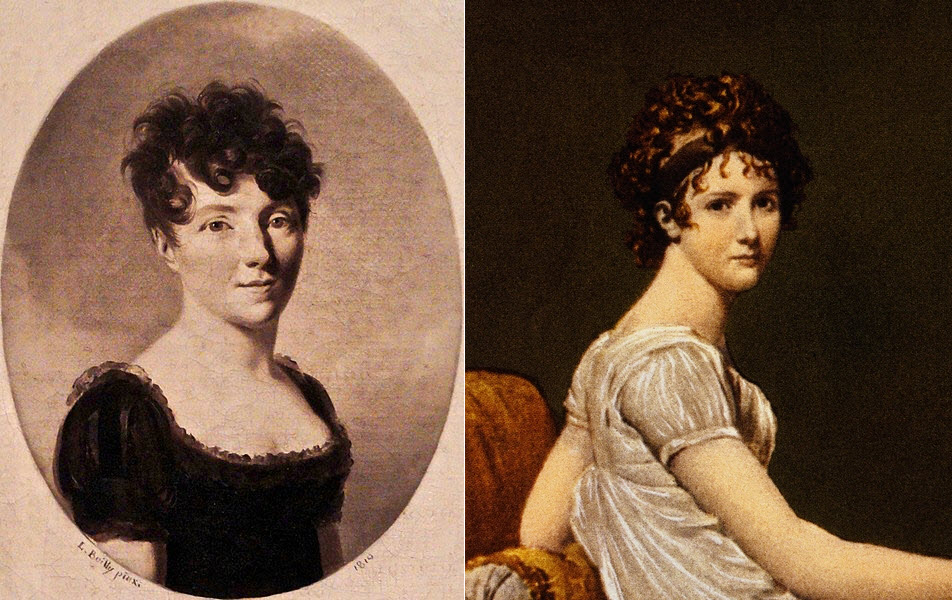
Épinglé sur UNESCO EUROPE
Sporting the fashionable haircut à la Titus, this figure clasping a script in his left hand is the Parisian actor known as Dublin (1761-1820). He was once a member of the famous troupe at the Théâtre de la République and favored comedic roles. Though a prolific actor, he enjoyed greater fame as a costume designer. In 1804, he designed Napoleon's coronation robe, and from 1815 until his.

Cuirassed statue of Titus. Naples, National Archaeological Museum.
A far cry from the elaborate sky high wigs and basket-shaped skirts adopted by Marie Antoinette before the revolution, fashion post-Revolution was heavily influenced by the drama she and her fellow aristocrats endured. Bringing new meaning to the term, "fashion victim", the trend was to literally dress like the victims of the revolution.

Dates and Sources Titus Andronicus Royal Shakespeare Company
A brief history of the coiffure a la Titus, the short women's hair style which was popular in the late 18th to early 19th century.

GRoW Annenberg
The fashion journals as early as an VI (1798) had proposed short haircuts called "à la Titus", "hedgehog" and "à la Caracalla". Palette, a hairdresser of the time, even had published a 'Eulogy of the "a la Titus" haircut for women', claiming that the studied disorder of the style "gives an air of youth and replaces all ornaments, jewels and feathers".

прическу а la Titus, 14 тыс изображений найдено в Яндекс.Картинках Эдвардианские прически
The style became fashionable, and women cut their hair short and wore a coiffure à la victime, coiffure à la guillotine, or coiffure à la Titus. (It was called the "Titus cut" because before.

Épinglé sur Coiffure
The answer takes us back to 18th-century France, during the French Revolution. During the later years of the French Revolution, many fashionable young men and women of the upper and middle classes began to cut their hair short. It was called the Titus haircut, or coiffure à la Titus. The name is a reference to Titus Junius Brutus, the elder.

The Guillotine Haircut Amusing
An eponymous hairstyle is a particular hairstyle that has become fashionable during a certain period of time through its association with a prominent individual. Women Louise Brooks and her bob, c. 1928 1920-1950

прическу а la Titus, 14 тыс изображений найдено в Яндекс.Картинках Винтажные шляпы, Рисунки
51 982 views 8 months ago Dearest Reader, it has been a project of mine for sometime now to turn my husband into a proper regency gentleman. I have made him a vest and a coat, acquired for him.

18+ Neat Titus Cut Hairstyle
Language links are at the top of the page across from the title.

прическу а la Titus, 14 тыс изображений найдено в Яндекс.Картинках Римские прически, Римское
This decorative accessory was succeeded by the watch chain towards the end of the nineteenth century. Following the introduction of a duty on hair powder in 1795, to help finance the wars against France, the wearing of wigs declined and men wore their own hair, styled à la Brutus or à la Titus, emulating the heads of Roman statues.

16 septembre 1798, An 6, (62) Cheveux à la Titus (...) A4 Poster, Framed Poster Print, Framed
The latter Titus is a character in the play Brutus by the French Enlightenment writer Voltaire. The play is about Titus's participation in the Tarquinian conspiracy, for which Lucius Junius Brutus (the "Brutus" in the title) condemns his son to death. Brutus first appeared on the French stage in 1730.

Pin on Short Hair
In this highly moralizing allegory, the young woman's hair is styled modishly à la Titus, a short bob in emulation of a hairstyle favored by ancient Roman republicans. View more Due to rights restrictions, this image cannot be enlarged, viewed at full screen, or downloaded.

Coiffure à la Titus Shannon Selin
At bals à la victime (victims' balls), the sons and daughters of executed French aristocrats danced in bizarre revelry. In the 1830s, French historian Théophile Lavallée wrote of the events, "at which one danced in mourning clothes, and to which only individuals whose relatives had perished on the scaffold were admitted."

Bust of Emperor Titus , Flavian dynasty, imperial age, marble. News Photo Getty Images
cartoon was that the coiffure à la Titus was the woman's head undressed. Seemingly, no modifications to the style would ever assuage the outrage of its critics. The Titus could be given flowers and curls, but the leopard could never change its spots. This thesis examines the "lifespan" of the coiffure à la Titus and the broader implications

Titus Haircut Haircut and Hairstyle
Witz-choura de Satin. A Parisian lady required 365 head-dresses, the same number of pairs of shoes, 600 gowns, and twelve chemises. Among the ephemeral fashions of the Directory one was to dress the hair "à la victime.". This entailed the loss of the victim's tresses, which were cut off quite close to the head.

Titus Flavius « IMPERIUM ROMANUM
From Wikipedia, the free encyclopedia The bals des victimes, or victims' balls, were balls that were said to have been put on by dancing societies after the Reign of Terror. To be admitted to these societies and balls, one had to be a near relative of someone who had been guillotined during the Terror.